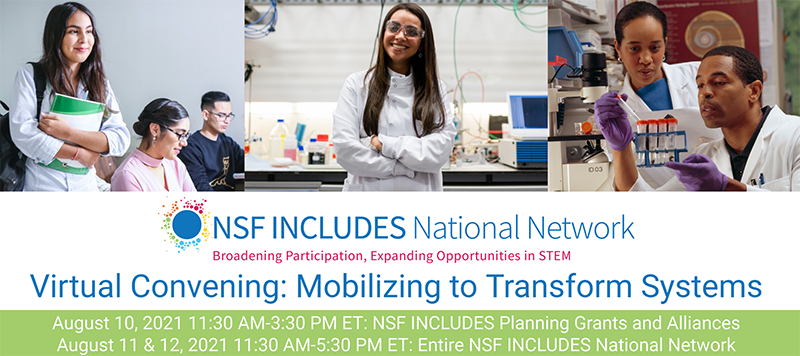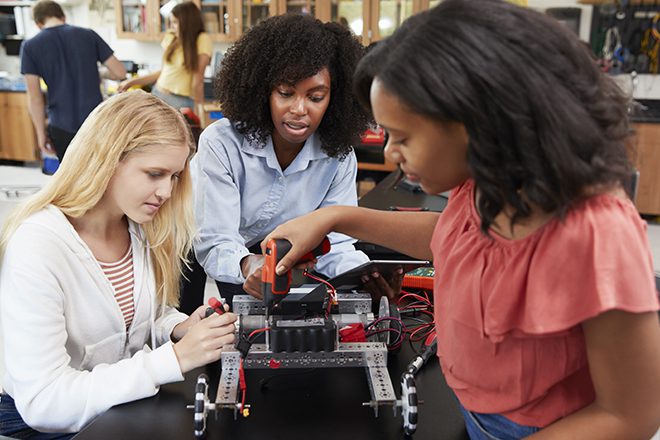
SRI Education is at the forefront of integrated science, technology, engineering, and mathematics (STEM) and computer science (CS) education from preschool through 12th grade. We develop and evaluate innovative instructional materials and assessments, design and study professional development initiatives, and research STEM and CS learning in and out of school. We focus on equitable access to high-quality STEM learning resources and opportunities for students who are underrepresented in STEM education pathways and careers. This quarter’s newsletter highlights some of our STEM and CS work and new resources.
Check out some of our recent STEM and computer science work:
- Whitepaper: Building Teacher Capacity in K–12 Computer Science by Promoting Formative Literacy
- Practice guide: Applying a Principled Approach to Develop and Use K–12 Computer Science Formative Assessments
- Journal article: Utilizing Evidence-Centered Design to Develop Assessments: A High School Introductory Computer Science Course
Join the INCLUDES National Network

Join the INCLUDES National Network! The NSF INCLUDES Network is open to anyone interested in improving diversity and inclusion in STEM. The Network brings together the power of many to strengthen STEM equity by connecting individuals, alliances, pilot programs, federal agencies, educational institutions, and other entities across the nation working to shift inequitable systems and broaden participation in STEM education and careers. Network members represent K-12, higher education, informal STEM education, and STEM careers and career advancement. Learn more about the Network.
Don’t miss a session of the Network’s Virtual Convening in August: Mobilizing to Transform Systems. The convening will feature flash talks and small breakout sessions with federal agency and industry representatives, including NASA, USGS, and Boeing.
Featured Project Work: National Comprehensive Center: Designing for Diversity (D4D)
The National Comprehensive Center (NCC), supported under the U.S. Department of Education’s Comprehensive Centers program, focuses on helping the 19 Regional Comprehensive Centers and state, regional, and local education agencies to meet the daunting challenge of improving student performance with equitable resources. The D4D project provides tools and resources for local education agencies (LEAs) that integrate design principles for equity and inclusion, such as using the Equity and Inclusion Framework for Curriculum Design (EI-CD) into science and engineering instruction. As part of this work, SRI Education staff authored a three-part whitepaper series addressing the challenges of moving diversity, equity, and inclusion from abstract ideas to actions that demonstrate the transformation of traditional thinking and practices in education.
- Designing for Diversity Part 1: Where is Equity and Inclusion in Curriculum Design?
- Designing for Diversity Part 2, The Equity and Inclusion Framework for Curriculum Design
- Designing for Diversity Part 3, Implementation of the Equity and Inclusion Curriculum Development Approach: The Role of State and Local Education Agencies
State and local education agencies can use these materials and resources to support teachers in designing and using equitable and relevant curriculum materials that improve access to high-quality STEM and CS learning for traditionally underserved students.
Using STEM to Inform New Education Models
Research Infrastructure for 21st Century STEM Education
National attention is focused on the Biden administration’s $2 trillion proposal for infrastructure to support sustainable, broadly shared prosperity. But what exactly counts as infrastructure? Will these investments also build the needed human capital and systems for developing our future STEM workforce? Can it also encompass intangible foundations of a productive society, such as human capital and systems for providing care? With a grant from NSF, SRI Education conducted a series of workshops with researchers, practitioners, and other key stakeholders to generate ideas and excitement for research infrastructure projects in STEM education.
Read more about the workshops.
Evidence-based Strategies for Attracting and Retaining Girls and Women in STEM
The NSF INCLUDES Coordination Hub created its latest research brief, Evidence-based Strategies for Attracting and Retaining Girls and Women in STEM, in partnership with NSF INCLUDES Network member organization the National Girls Collaborative Project (NGCP) to highlight gender disparities in STEM from educational pathways to career choice. The brief discusses evidence-based strategies that can address the barriers to girls’ and women’s participation in STEM and incorporates intersectional approaches to address inequalities specific to the experiences of girls and women of color. To learn more, read the brief.
Check Out Our Videos From the 2021 STEM for All Video Showcase
Understanding Group Interactions in STEM

SRI’s Assessing Collaboration Through Innovative Vision Technology (ACTIVITY) project is measuring and supporting collaboration as students engage in STEM learning activities. The project will result in both an improved understanding of productive collaboration and a prototype instructional tool that can help teachers identify nonverbal behaviors and assess collaboration and engagement quality.
This project is particularly timely, as professional and learning settings are increasingly requiring the ability to collaborate and engage in group work. The project will help support the development of collaboration skills among students, even in both traditional and non-traditional forms of education.
Watch the video “Understanding Group Interactions in STEM.”
SPICE: Science Projects Integrating Computing and Engineering

SRI’s Science Projects Integrating Computing and Engineering (SPICE) project is addressing the critical need for curriculum materials that integrate science, engineering, and computational thinking.
A three-week project-based curriculum unit engages upper elementary students in hands-on activities and a technology-supported inquiry curriculum. Students investigate the urban water runoff phenomenon and design a schoolyard with different surface materials in a way that minimizes impacts from this runoff. Students use a block-based computational modeling environment and a domain specific modeling language to develop a computational model of water runoff and investigate system model variables related to rainfall, absorption, and runoff.
Watch the video “SPICE: Science Projects Integrating Computing and Engineering.”
New Research Center Addresses Inequities in
Online Learning in College

SRI Education and the Community College Research Center (CCRC) at Columbia University’s Teachers College launched a new research center, thanks to a new $10 million award from the U.S. Department of Education’s Institute of Education Sciences. SRI and CCRC have partnered with Achieving the Dream, a national leader in championing evidence-based institutional improvement with a network of more than 300 colleges, and nine broad-access colleges to conduct research on how educational technology and instructional strategies can bolster students’ skills for managing their own learning. Learn more about the new center.
New Blog Posts & Publications
- Blog post: Molly of Denali Teaches Children To Use Informational Text
- Blog post: How Do They Fare? The Impact of Participating in Health Pathways on Student Outcomes
- Blog post: How Early Childhood Education Providers Can Use COVID-19 Relief Funds to Establish Lasting Mental Health Supports for Staff and Children
- Report: The Efficacy of Digital Media Resources in Improving Children’s Ability To Use Informational Text: An Evaluation of Molly of Denali from PBS KIDS
- Guide: REL Central guide: Identifying Similar Schools to Support School Improvement
- Journal article: Strategies for Success in Community Partnerships: Case Studies of Community Collaboratives for Early Learning and Media
- Journal article: Peer Effects on Dual Language Learners’ English and Spanish Receptive Vocabulary Development
- Journal article: Measuring the Impact of Trauma-focused, Cognitive Behavioral Group Therapy With Middle School Students
- Journal article: In the NIC of Time: How Sustainable Are Networked Improvement Communities?
- Journal article: Taking Away Excuses to Quit: The Role of Supports in Completion and Learning in Online Professional Development for Teachers



